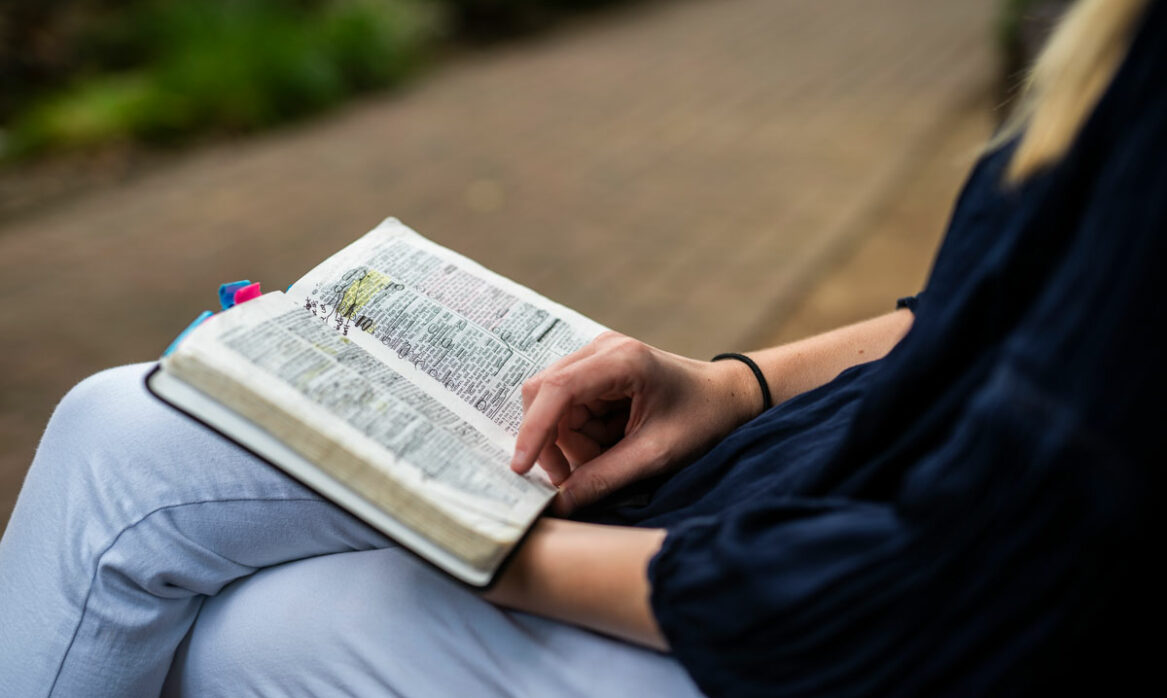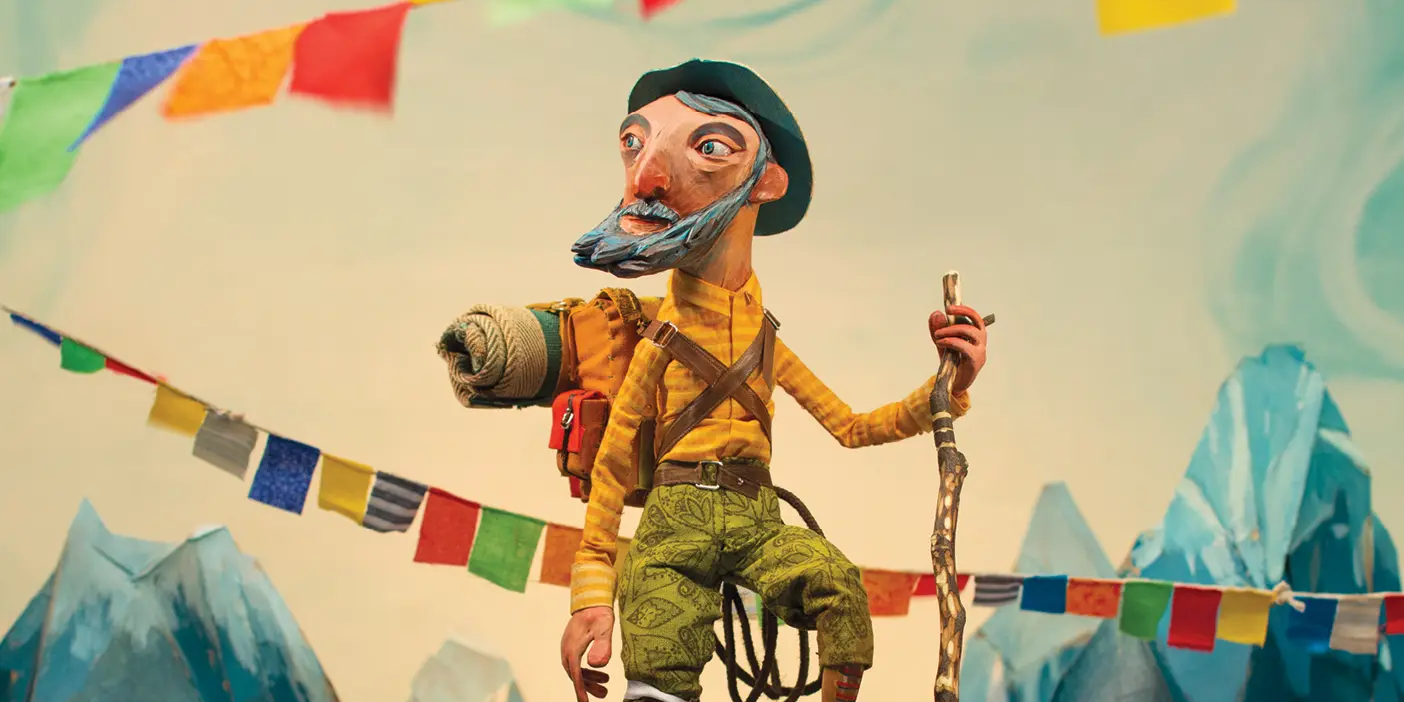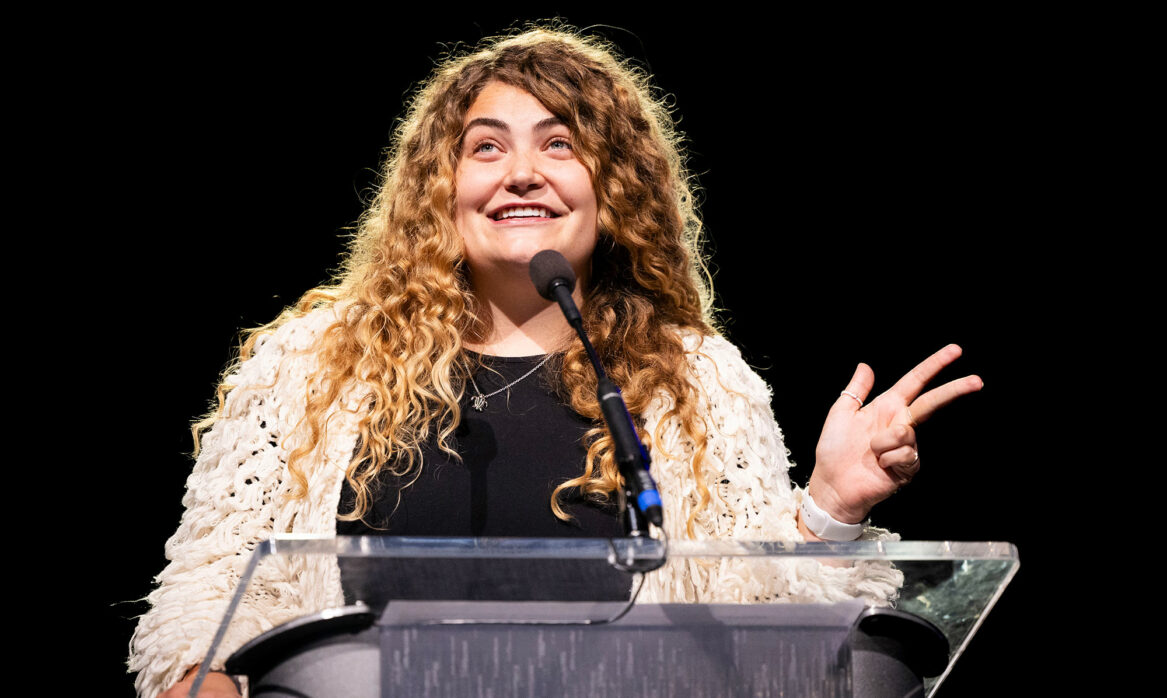Lessons from the Fall
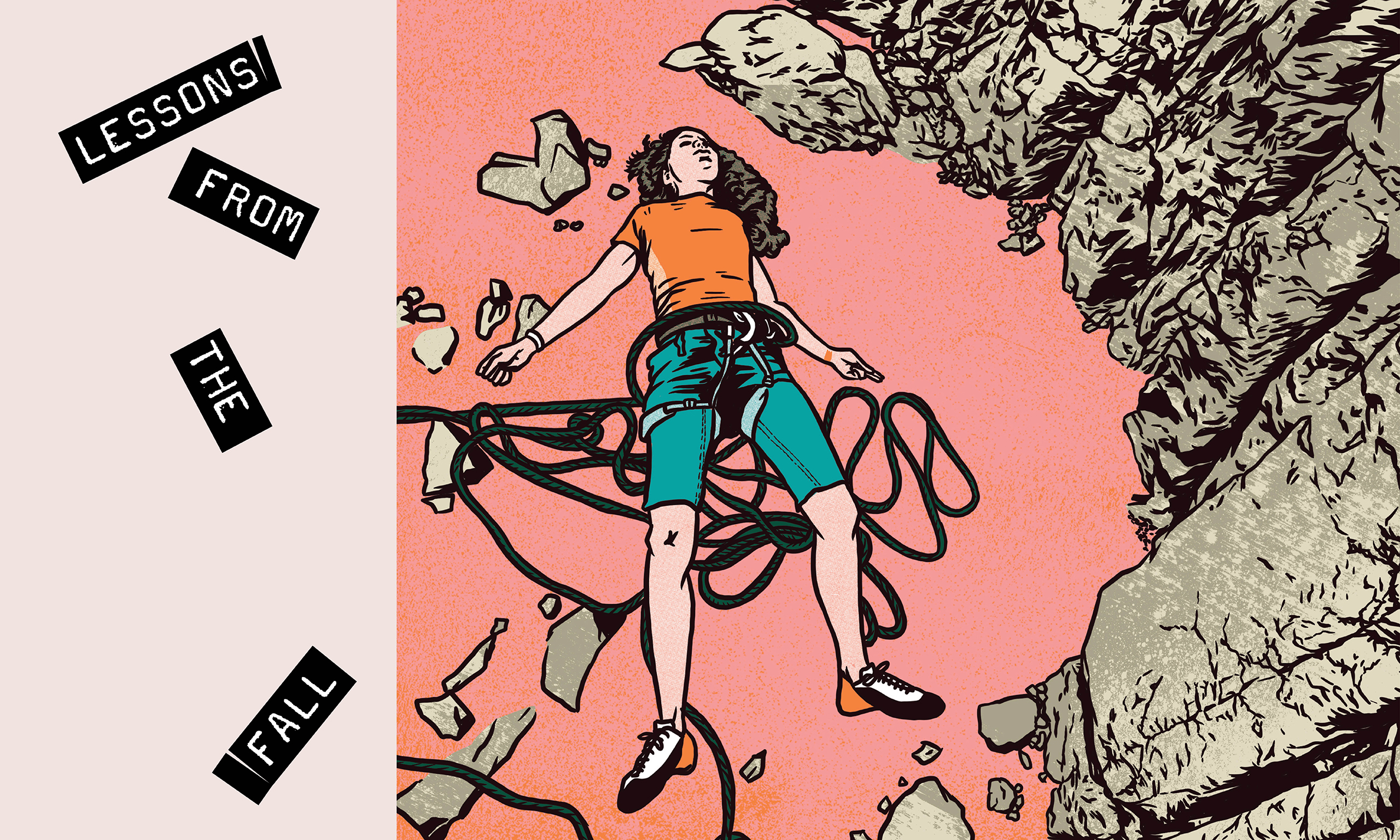
Lessons from the Fall
A 30-foot rock-climbing fall becomes a master class with God on life, listening, and love.
By Whitney Singley Archibald (BA ’01) in the Winter 2024 issue
Illustrated by Peter O’Toole
“I will be on your right hand and on your left, and my Spirit shall be in your hearts, and mine angels round about you, to bear you up.” [D&C 84:88]
I lay on my back, looking up at a cartoonishly blue sky. A dragonfly meandered in and out of my field of vision. I wiggled my toes (check) and my fingers (check). I moved my head to the side and determined I didn’t have head trauma—not even a headache—and my thoughts were clear and coherent (check). Breathing, though? Not good—quick, shallow, and painful. And the rest of my body? Blazing with pain.
Even amid my anguish, I knew it already: this was a miracle. It wasn’t until I saw a picture later that I discovered just what a miracle it was.

That July morning I had brought my 15-year-old son, Miles; my brother Brett C. Singley (BS ’09, MS ’13); sister Hayley Singley Kirkland (BS ’10); and five nieces and nephews on a climbing excursion in Rock Canyon, just a few miles from BYU campus. It was the perfect morning for a climb—light breeze, 70 degrees—and I was practically giddy with nostalgia, pointing out crags I had conquered as a student 20-some years before. I led the group to the Kitchen, the most accessible beginner climb in the canyon, a little nook right on the main trail.
This was going to be a particularly busy day for me—the last of a summer trip to Utah in which I combined family-reunion events with work appointments as host of the Y Magazine podcast. Immediately after our climbing adventure, I would descend to campus to interview a professor for one podcast episode and gather audio of candid student responses for another. I’d spend the rest of the workday planning upcoming episodes with the Y Magazine staff. That night I had tickets to a bucket-list concert. The next morning I’d drive my kids back home to Colorado. But for now I was reveling in the sight of these rugged brown cliffs that I knew and loved.
Miles and I hiked up together to the top of the climb to set up our ropes. I had imagined moments like this—literally showing my kids the ropes—since I started climbing back in high school. I’d learned to climb in my eastern Sierra Nevada hometown of Bishop California—a mecca for climbers the world over. I immediately fell in love with everything about the sport—the challenge of mastering a climb, being outside with friends for hours at a time, cheering each other on, the feel of the rock under my fingertips.
Although Miles had been climbing for several years and had helped me set up top ropes before, he still got my full, overly cautious safety lecture: every part of the anchor has to be redundant, with two points of contact to the rock, double knots, double carabiners, and two people checking that everything is set up right.
“Narrate your steps out loud, so you make sure you remember them all,” I coached. We checked and double-checked our anchors, fed the ropes through, and prepared to rappel down to our family below. But first, one more lecture:
“Now you have to make sure that both ends of your rope reach the ground. This is one of the most common ways climbers get hurt—running out of rope and short-roping themselves.”
With that, we hollered down to our ground crew to verify that both sides of the ropes were down then lowered ourselves safely to the ground.
Once down, though, I didn’t like the way my rope was rubbing over the edge of the rock wall. To err on the side of caution, I decided to reset the rope to a different set of anchors on an adjacent face.
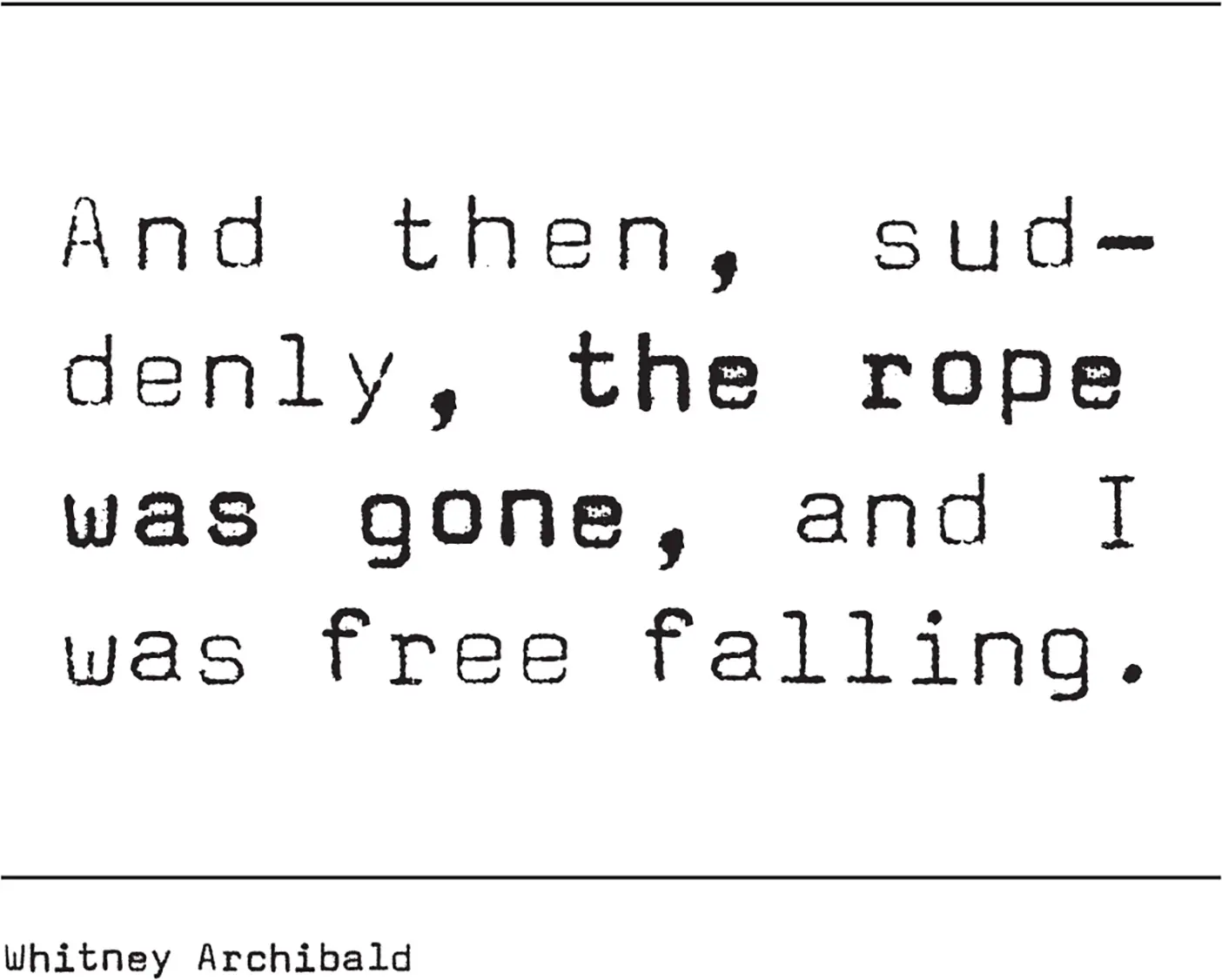
I laced my climbing shoes up tight and tied into the rope, with Miles belaying me, taking in the slack as I worked my way up the sheer wall. I was pleased with the route—not too hard but with a few fun problems to solve. The kids would love it.
I climbed up and over the edge. Once I was safely tethered to an anchor point above, I told Miles to go ahead and help my nephew start climbing the other route. I set up the rope on the new anchors and, again, verified that both ends of the rope reached the ground. But then I realized I had forgotten my rappel device, so I had Brett tie it to one end of the rope and send it up to me.
I hooked into the rope, swung myself over the edge with a little yelp, and started to lower myself.
And then, suddenly, the rope was gone, and I was free falling.
I hadn’t returned the rope to the ground.
I had short-roped myself.

Some people describe falling as happening in slow motion, every moment playing out in excruciating detail. But my fall felt instantaneous—one moment the rope slipped free from my grasp, the next I lay on my back in the dirt at the base of the wall. It was clean as falls go: straight down, backward, my body making a V in the air. I had fallen 30 feet. (I know this now because my parents later returned to the Kitchen and measured.)
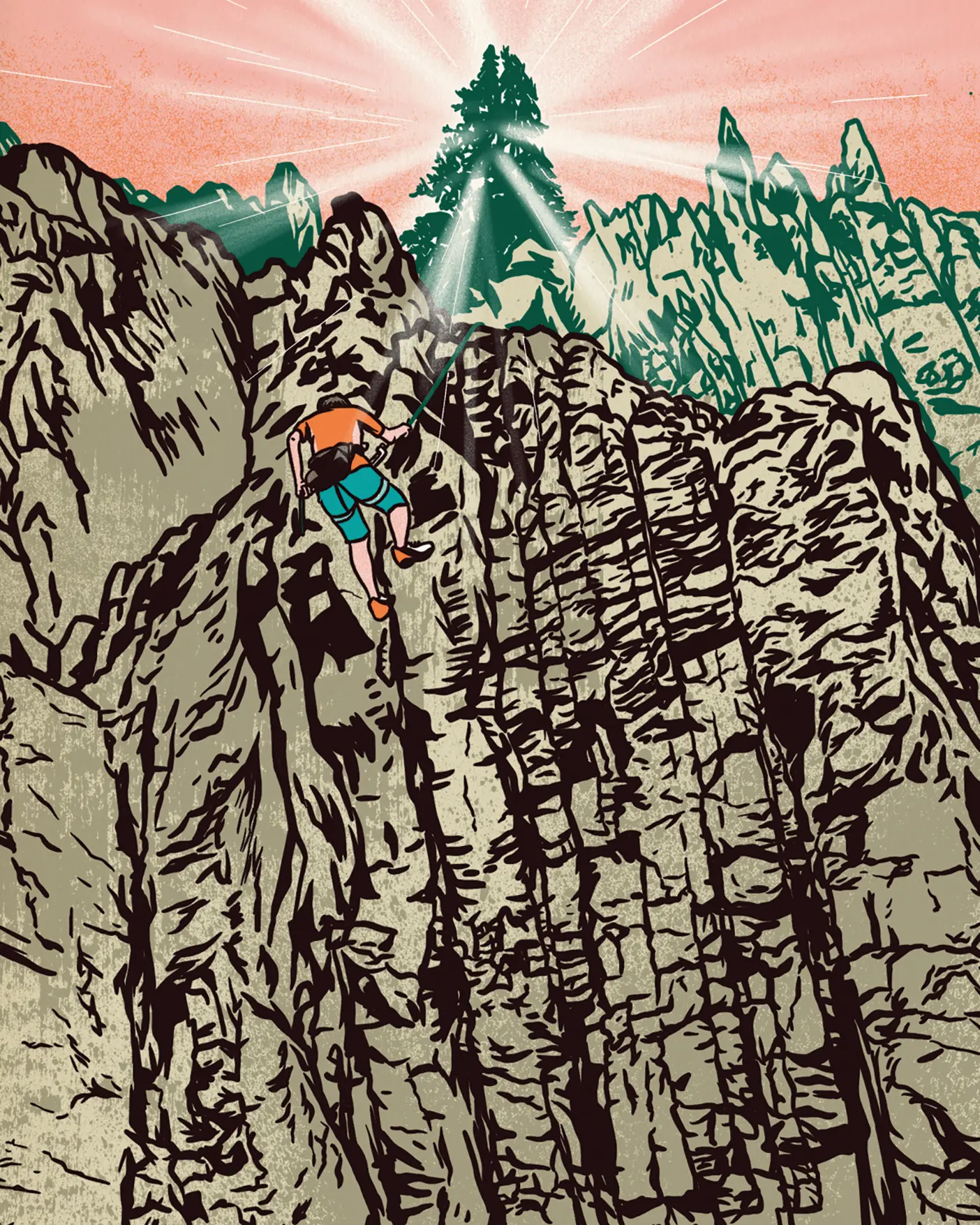
But all I knew in that moment, as I struggled to fill my lungs, was agony.
The pain exploding through my back and pelvis was indescribable—not a word I use lightly. As a writer I like to be able to describe things. But I have no words for this. If childbirth was a 10, this had to be at least a 15, if not a 20.
Amid the pain was shame. “Idiot. I’m such an idiot,” I croaked, even before catching my first full breath. How many people had I lectured about avoiding this very mistake?
Just as I started beating myself up for my oversight, I heard the following words distinctly in my mind: “You are human, and humans make mistakes. It was an accident.” I wasn’t a careless climber; I was a careful climber who made a mistake. Immediately the shame dissolved.
It was the first of many lessons the Lord would bless me with that day.
From that moment until I arrived at the hospital, I experienced a direct line of communication with Him—almost as though my mind and body were disconnected. The Lord seemed to be occupying my mind in conversation, teaching me and comforting me so I could withstand the pain.
Brett ran to my side, scanning me for bleeding and patting my sides to assess my injuries, and then called 911. Miles stayed remarkably calm, helping Hayley lead the kids up the trail a bit, so they wouldn’t see me in this state. Then he hiked up to gather our gear. As Hayley joined Brett at my side, I was confused why they kept asking about my wrist.
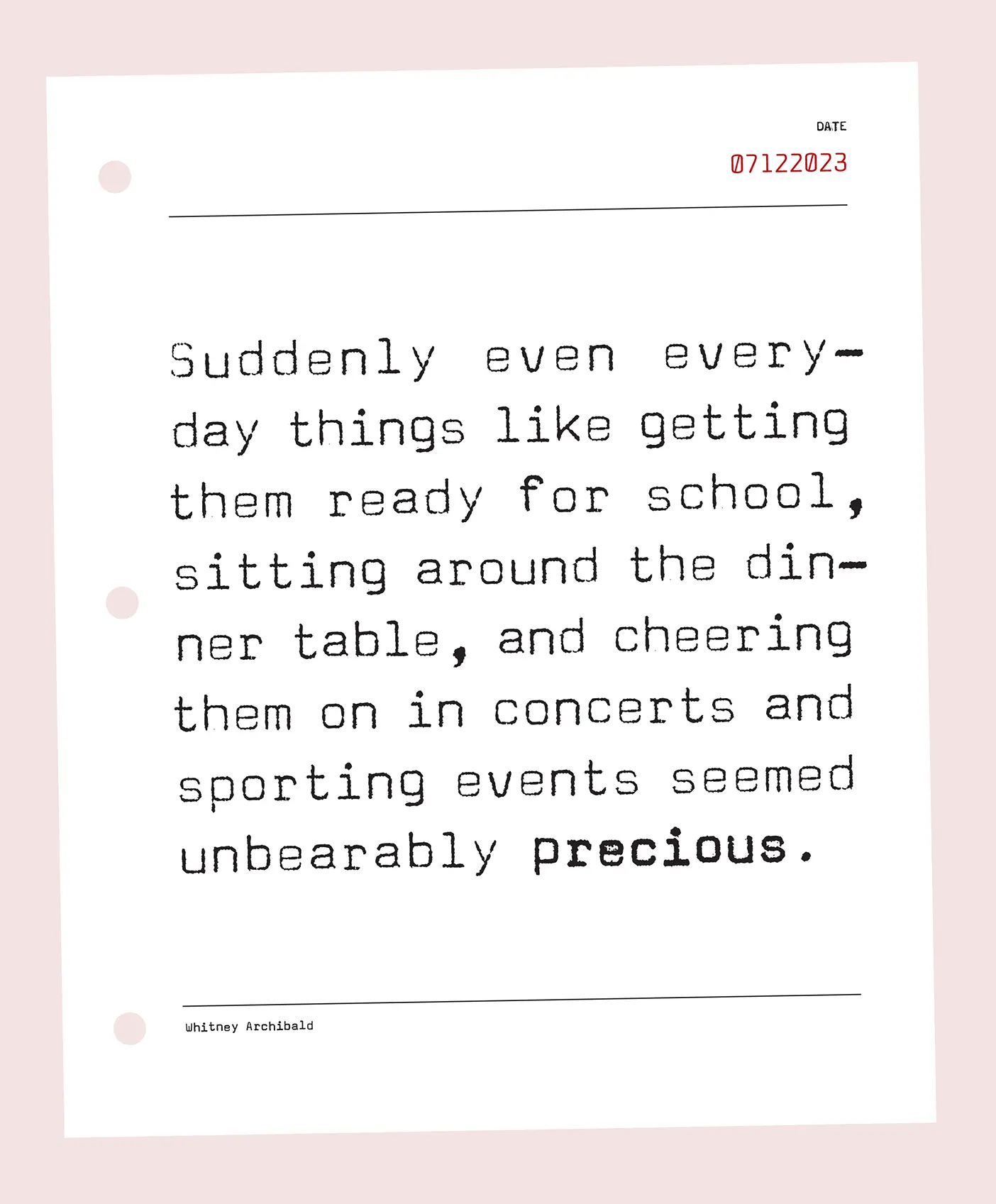
With so much pain coursing through my torso, I hadn’t even noticed the gruesome open fracture in my left arm.
As we waited for the ambulance, Hayley took a picture of me on the ground, partly to document the fall for my husband, David J. Archibald (BS ’01), back home in Colorado, and in case the doctors wanted to see how I landed.
That photo revealed a miracle. I had landed in the only Whitney-sized clearing at the base of the cliff—rocks all around me. Inches to the right or inches higher, and I surely would have hit my head on a rock.
Just hitting the dirt from such a height should have hurt my head at least a little. The laws of physics would seem to dictate that my head would have hit the ground hard as well, probably with whiplash to boot. But there wasn’t a bump or a scratch.

Although breathing and talking remained difficult, I tried to reassure my family that I was okay, even joking a little: “At least my mosquito bites aren’t bothering me anymore.”
But I wasn’t so sure I would be okay.
I told the Lord I really didn’t want to go now. I wanted to be here to raise my five kids, ages 8 to 17. Suddenly even everyday things like getting them ready for school, sitting around the dinner table, and cheering them on in concerts and sporting events seemed unbearably precious. At the same time, I told Him that if it was time, I had tried my best.
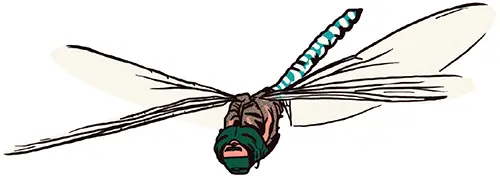
God doesn’t always let us see how things will turn out up front, but this time He did. Immediately—again through that miraculous spiritual connection—He let me know not only that I would live but that I would fully recover. That understanding was the greatest and most unexpected gift the Lord could have given me at that moment, and I instantly knew it was true. My body still felt like an inferno, but without the burden of fear and uncertainty, I knew I could endure it.
As we waited the 12 minutes for the paramedics to arrive, I let my mind move through my calendar. I had Hayley cancel my appointments at BYU. I apologized that we’d all have to miss the concert that night. And I remembered that in exactly one week, David and I were supposed to be on a flight to Europe with our oldest son, Jonas, for the senior trip we’d been planning for more than a year.
Again, the Lord intervened with understanding: No one would mind canceled appointments. There would be other concerts. Europe would still be there when I was better. The only thing that mattered was that I still got to be with my people—my family and friends—and that my people still had me. I felt a rush of gratitude that would sustain me throughout my rehabilitation, recognizing that many people in accidents this serious do not survive. I would not take this miracle for granted.
As the peace of those thoughts calmed my racing mind, I heard the rumble of an approaching ATV carrying a team of four paramedics. After assessing my situation, they cut the laces of my climbing shoes and tried to slide my harness off. But that was excruciating, and I told them to just cut the harness away.
The paramedics directed Hayley and Brett to each hold one of my legs as they all lifted me carefully onto a backboard. I groaned as they strapped me tightly to the board and lifted it onto the back of the ATV. Walking along behind, they held me securely as we drove 100 yards down the gravel trail to the waiting ambulance. My family trailed behind in a slow procession.

I was desperate for even a moment of relief from my suffering, but the paramedics explained that because of my low blood pressure, they couldn’t give me any pain medication until I arrived at the hospital. I braced myself for the ride.
Again the Lord spoke to me, word for word: “Not everyone gets to feel this much physical pain all at once and live.” The words gets to caught me off guard, and I knew they were deliberate.
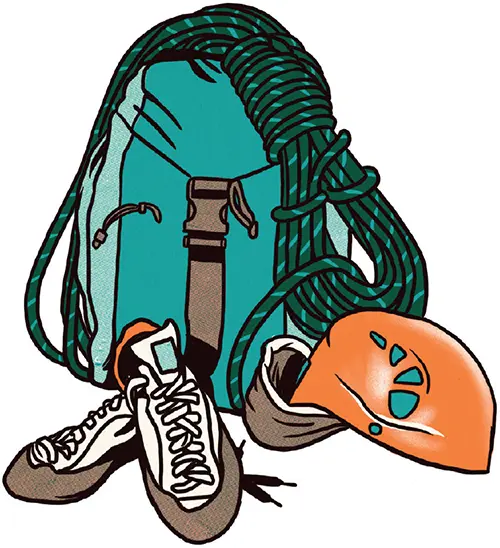
I have had enough trials in my life to know that perspective usually comes after the trial. You look back after the trial has passed and see how much you have learned and grown. This time the Lord gave me the gift of perspective right up front, and I started to see this trial as an opportunity rather than a loss.
I knew then that this accident would be transformative for me and for my family. For one, I had never felt such a direct conduit to inspiration. I knew the long recovery would also help me stretch and grow. The Lord also promised me that my family would become stronger and grow closer together. Because of my fall, my children would become more responsible and resilient. Already I had seen Miles step up and take charge after the accident. And I knew this experience would have more of an impact on my oldest son, Jonas, than any trip to Europe ever could.
Then there were those words: gets to feel this much pain. As we sped to the hospital, I realized that I now understood more about the Savior and His suffering than I ever had before, a dawning comprehension and appreciation for what He felt—what kind of agony was physically possible. But it also hit home that He chose to feel this pain— plus emotional and mental anguish—voluntarily.

In the ambulance these paramedics, who didn’t know me at all, helped me breathe, stroked my face, and reassured me that it would be a short ride. From the minute they had pulled up on the ATV, I could feel and almost see love radiating from them. It was a tangible force. Every ounce of their energy was focused on increasing my comfort and getting me safely to the hospital.
In turn, I felt so much love and gratitude for them pouring in from the Spirit. Again, I heard distinct words, teaching me: “This is the pure love of Christ.” I knew at that moment that this was the essence of the gospel, the capital P Priority.
As others carried and comforted, I sensed a strange identity shift and knew that I was going from caregiver to care recipient. I knew I was entering a stage in my life when it was my turn not “to act” but “to be acted upon” (2 Ne. 2:13). I would have to be patient and humble and let others serve me. And so they would—visiting me in the hospital, providing meals, driving my kids to their various activities, and praying. So much praying.

An MRI scan at the hospital soon revealed the extent of my injuries. Along with my broken wrist, my sacrum had snapped and shattered. My pelvis had cracked in three places. I also had burst fractures in three vertebrae, a broken sternum and some broken ribs, a partially collapsed lung, and internal bleeding.
But, as I had assessed at the foot of the climb, the doctors confirmed that I had not even a scratch, bump, or bruise on my head. The only explanation I can give is this, from Psalms 91:11–12: “For he shall give his angels charge over thee, to keep thee in all thy ways. They shall bear thee up in their hands, lest thou dash thy foot against a stone.” I truly believe angels cradled my head during that fall.
Over the next three days, surgeons pieced my body back together, and I began my slow recovery. I passed through all the developmental stages from my childhood as if truly starting life again—learning to roll over, feed and clothe myself, and eventually sit up. After one month I left the hospital in a wheelchair. After two I regained the use of one leg. And by three months after the accident, my family was cheering me on as I took my first tentative post-accident steps. With extensive therapy, my doctors expect a full recovery by a year after the accident.
But I know I’ll never really be the same, and I’m grateful for that. I’ve worked to hold on to those precious insights that came to me in my time of great distress. Even as it was unfolding, I felt a desperate need to record the inspiration I was receiving. In the ambulance I wished for pen and paper. In fact, when I awoke in the middle of my first night in the hospital, I dictated five pages of notes to my mother.
Despite the pain and the long road ahead, I will always be humbled by this second chance at life and grateful for the lessons from my fall.
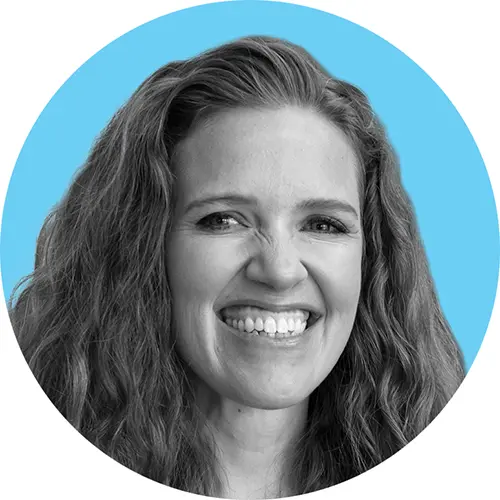
Whitney Archibald, the host of the Y Magazine podcast, lives in Castle Rock, Colorado.
Feedback Send comments on this article to magazine@byu.edu.


